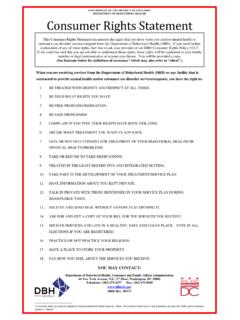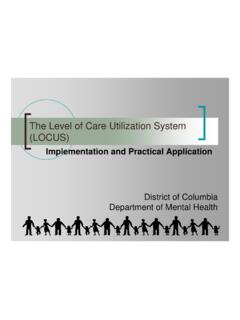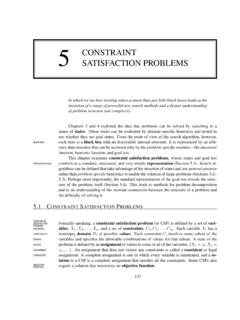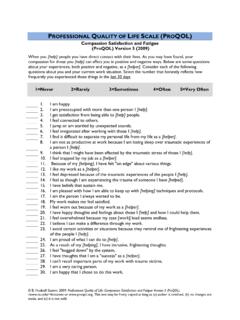Transcription of Behavioral Health Satisfaction Survey Mental Health ...
1 0 64 New York Avenue, NE, Washington, DC 20002 Applied Research and Evaluation Data and Performance Management 2016 Behavioral Health Satisfaction Survey Mental Health Statistics Improvement Program (MHSIP) and Youth Services Survey for Families (YSS-F) Narrative Report Perceptions of Public Mental Health Services in the District of Columbia among Adults and Caregivers of Children and Youth Department of Behavioral Health 1 EXECUTIVE SUMMARY The Applied Research and Evaluation (ARE) Unit of Data and Performance Management, in the Department of Behavioral Health for the District of Columbia, implemented and completed an analysis of both the annual Mental Health Statistics Improvement Program Survey (MHSIP) for Adults and the Youth Services Survey for Families (YSS-F)1.
2 Each year, the Department of Behavioral Health (DBH), as well as other states, is required by the Substance Abuse and Mental Health Services Administration (SAMHSA), Center for Mental Health Services (CMHS) to conduct a Survey of consumers perceptions of the Mental Health care they received from the community Mental Health system. The results from this Survey are reported annually to CMHS as part of the requirements for the Mental Health Block Grant. Collecting data nationwide allows SAMHSA, and other states, the opportunity to compare system strengths and challenges on a national level, identify areas for improvement, and work to implement changes.
3 From a random sample of adult consumers (N = 2600) who received at least two Mental Health services in the past six months within the fiscal year of 2016 (October 1, 2015 through September 30, 2016), 390 completed the MHSIP Survey . Quantitative and qualitative analyses of the seven domains were conducted. Two domains had the highest scores: Quality and Appropriateness (82%) and Satisfaction (79%). Social Connectedness (63%) and Outcomes (67%) were the lowest scoring domains. Out of a random sample of child and youth consumers (N = 2600), who received at least two Mental Health services in the past six months within the fiscal year of 2016 (October 1, 2015 through September 30, 2016), 410 of their caregivers completed the YSS-F Survey .
4 The two domains with the highest scores were Cultural Sensitivity (92%) and Participation in Treatment Planning (85%). Functioning (55%) and Outcomes (55%) were the lowest scoring domains. The following report provides a more detailed, narrative analysis of the MHSIP and YSS-F data. Implications for clinical practice and policies for Behavioral Health are discussed. 1 As of the writing of this report, the Mental Health Statistics Improvement Program Survey (MHSIP) for Adults and the Youth Services Survey for Families (YSS-F) now fall under the umbrella of Behavioral Health Satisfaction Survey (BHSS).
5 This report will refer to the surveys as MHSIP and YSS-F; however, note that in future reports, the surveys will be referred to as BHSS-MHSIP and BHSS-YSS-F. 2 ACKNOWLEDGEMENTS Principal Investigator: Crystal Williams, , Program Analyst Consumer Satisfaction Project Work Team: Colin Billett (Quality Improvement Coordinator); Laura Heaven (Chief, Data and Performance Management), Stephony Humphrey ( Behavioral Health Analyst), Cemone Bynum (Data and Project Management Specialist), Denise Wright (Applied Research and Evaluation Manager) Surveyors: Norman Jones, Tara Murphy, Sabrina Slater, Timothy Robinson Respondents: Special thanks to the consumers and caregivers of the youth for their participation.
6 Sharing their unique experience is instrumental in shaping the direction of system and quality improvement strategies for the District of Columbia s Department of Behavioral Health . FOR MORE INFORMATION CONTACT: Laura Heaven, LICSW Chief, Data and Performance Management Department of Behavioral Health (202) 671-4147 3 Table of Contents EXECUTIVE SUMMARY ..1 ACKNOWLEDGEMENTS ..2 INTRODUCTION ..4 METHODOLOGY ..5 Sampling and Data Collection ..5 Scoring and Analysis ..6 LIMITATIONS ..6 FINDINGS ..7 Adult Consumer Satisfaction by Year ..7 Caregiver Satisfaction by Year ..8 Domains and Demographic Variables ..8 Arrest and Attendance History.
7 9 Transition-Age Youth of Care ..16 Analysis of Respondents Comments ..17 IMPLICATIONS FOR PRACTICE .. Error! Bookmark not defined. ADULT .. Error! Bookmark not defined. Error! Bookmark not defined. SUMMARY ..22 APPENDIX B. MHSIP Survey Items ..24 APPENDIX C. YSS-F Survey Items ..26 APPENDIX D. Demographics ..28 APPENDIX E. Transition-Age Youth Demographics ..30 4 INTRODUCTION Each year, the Department of Behavioral Health (DBH), along with other states, is required by the Substance Abuse and Mental Health Services Administration (SAMHSA), Center for Mental Health Services (CMHS) to conduct a Survey of consumers perceptions of the Mental Health care they received from the community Mental Health system.
8 The results from this Survey are reported annually to CMHS as part of the requirements for the Mental Health Block Grant. Collecting data nationwide allows SAMHSA, and other states, the opportunity to compare system strengths and challenges on a national level, identify areas for improvement, and work to implement changes. The DC Department of Behavioral Health Applied Research and Evaluation (ARE) Unit analyzed both the annual Mental Health Statistics Improvement Program Survey (MHSIP) for Adults and the Youth Services Survey for Families (YSS-F). The MHSIP Survey presents statements about services within seven domains and asks respondents to state to what degree they agree or disagree with them.
9 The domains and a sample statement from each domain are shown in Table 1. Table 1. MHSIP Domains and Sample Statements Domain Sample Statement Access The location of services was convenient. Participation in Treatment Planning I, not staff, decided my treatment goals. Quality and Appropriateness Staff helped me obtain the information I needed so I could take charge of managing my illness. Social Connectedness I am happy with the friendships I have. Functioning I do things that are more meaningful to me. Outcomes I deal more effectively with daily problems. General Satisfaction I liked the services that I received here. The YSS-F Survey presents statements related to child and adolescent services with a similar set of seven domains and asks the parents or caregivers to report to what degree they agree or disagree.
10 The domains and sample statements are reported in Table 2. Table 2. YSS-F Domains and Sample Statements Domain Sample Statement Access The location of services was convenient for us. Participation in Treatment Planning I helped to choose my child s services. Cultural Sensitivity Staff respected my family s religious/spiritual beliefs. Social Connectedness I have people that I am comfortable talking with about my child s problems. Functioning My child gets along better with family members. 5 Outcomes My child is better at handling daily life. General Satisfaction Overall, I am satisfied with the services my child received. The outcomes of the MHSIP and YSS-F function as a report card on how satisfied consumers are with community Mental Health services and provide insight for what is needed to enhance quality and continuity of care.






